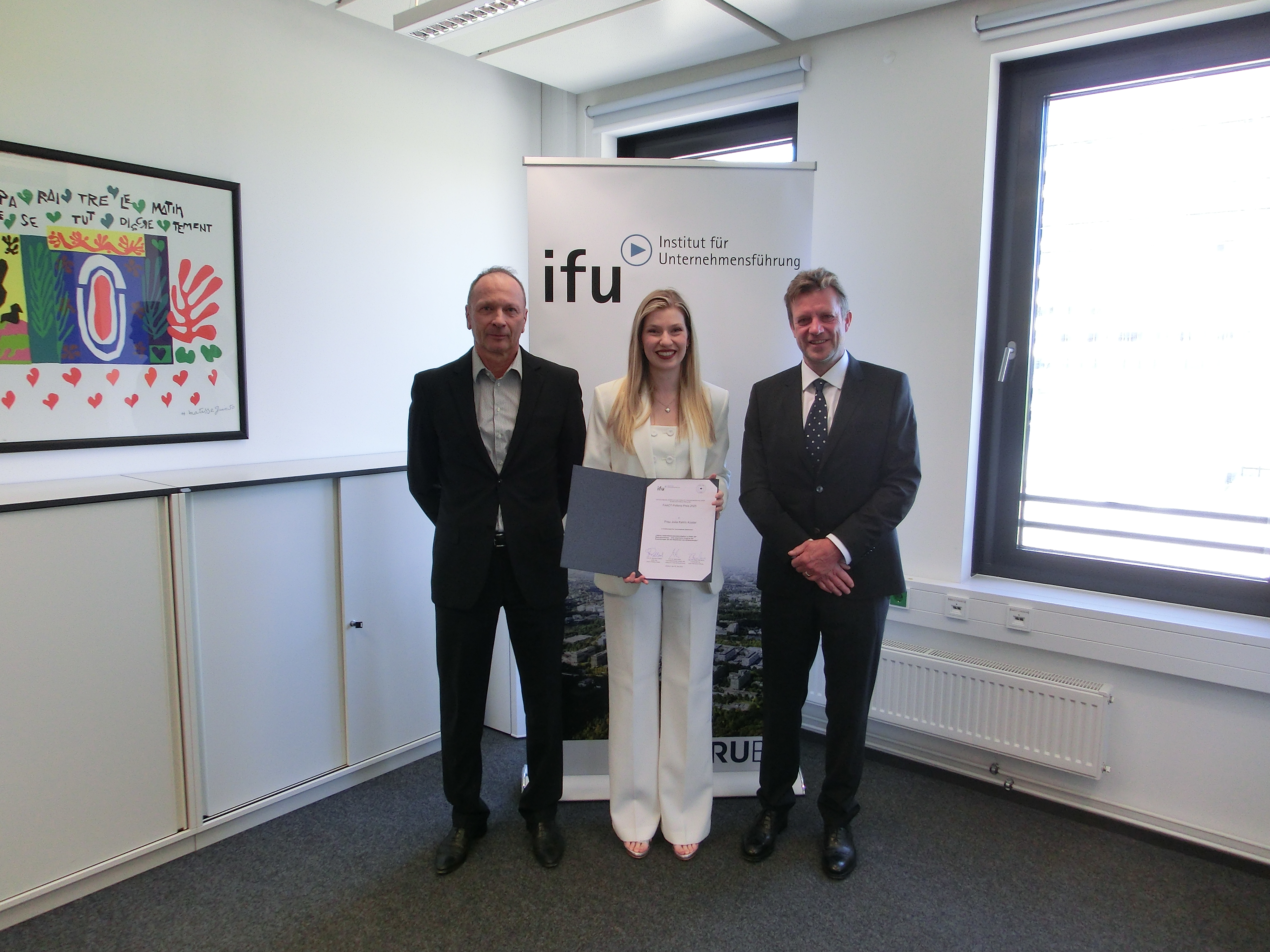FAACT-Pellens-Preis 2025
On May 8, 2025, the FAACT-Pellens Prize 2025 was awarded as part of the graduation ceremony of the Faculty of Business Administration and Economics at the Ruhr University Bochum. This prize, established by Prof. Dr. Bernhard Pellens by founding the Bernhard Pellens Foundation at the end of 2019, is awarded to outstanding master's theses and dissertations in the fields of controlling, accounting, auditing, taxation or corporate finance, which are characterized by a high degree of practical relevance in terms of problem definition and results. The prize is open to students of Ruhr-Universität Bochum and students of other universities if they were supervised by university professors who were academically trained at Institute of Management.
The work to be honored is selected by the Board of the Alwin Reemtsma Foundation, which includes the Chancellor of Ruhr-Universität Bochum, on the recommendation of the Institute for Corporate Management (ifu) at Ruhr-Universität Bochum..
This year's FAACT-Pellens Prize was awarded to Julia Köster for her outstanding Master's thesis on "Interne Kommunikation in Zeiten der Restrukturierung", which was supervised by Prof. Dr. Thorsten Knauer. The prize was awarded by the Chancellor of the Ruhr University Bochum, Dr. Christina Reinhardt.
After completing her Master's degree at the RUB (Master of Science in Management & Economics) in October 2024, Ms. Köster will work as a research assistant at the Chair of Controlling (Chair holder: Prof. Dr. Thorsten Knauer).

The photo shows, from left to right, the Managing Director of ifu Prof. Dr. Heiko Müller, Ms. Julia Köster and the Chairman of the Board of the Alwin Reemtsma Foundation Mr. Ralph Reemtsma.
© ifu, Schön
Interne Kommunikation in Zeiten der Restrukturierung und ihre Auswirkung auf Mitarbeitende
Increasingly, the question is no longer whether a crisis will occur, but when. Restructuring is one way of overcoming crises in the corporate context. These are deliberately initiated processes that involve a large number of organizational changes. The aim is often to reduce costs, increase productivity and/or cut staff. However, a significant proportion of restructuring measures fail to achieve economic success. The main reasons for this are the neglect of employee reactions and inadequate and non-transparent communication. Employees are among the most important stakeholders in crisis situations, as they can mitigate or exacerbate crises through their behavior. Internal communication offers the opportunity to influence the behavior of employees and thus actively influence the course of the restructuring.
Despite the important role of internal communication, its relevance has so far been insufficiently considered in science and practice. This raises the fundamental question of how internal communication affects the reactions of employees in the context of restructuring. To answer this question, a research model was developed based on psychological theories and knowledge of crisis and general communication. As there are hardly any illustrations of the design aspects of internal communication, a model of internal communication based on 15 design aspects was also created specifically for this research purpose.
In her thesis, Ms. Köster conducted expert interviews with five restructuring consultants who are actively involved in the operational implementation of restructuring. The text analysis suggests that ultimately eleven different design aspects of internal communication have an impact on the affective, cognitive and behavioral reactions of employees, both in isolation and together in the form of interactions. In addition, further relevant factors influencing these interdependencies were identified.
Overall, Ms. Köster provides a framework for internal communication in restructuring that reveals the impact on employee reactions. In addition, she emphasizes the importance of internal communication by establishing a link between internal communication, employee behavior and ultimately restructuring success.

